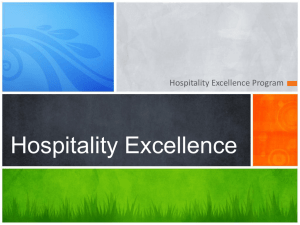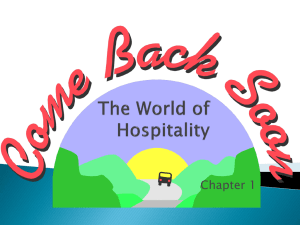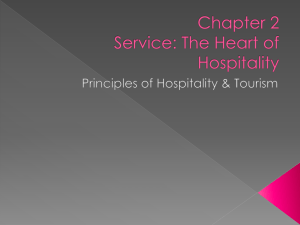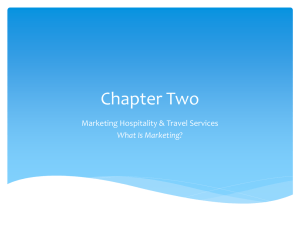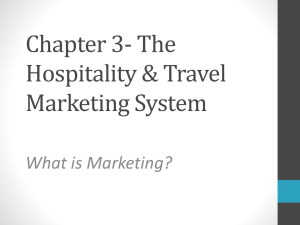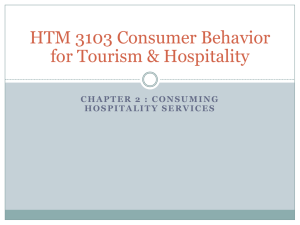PowerPoint Mr. Xander Lub
advertisement
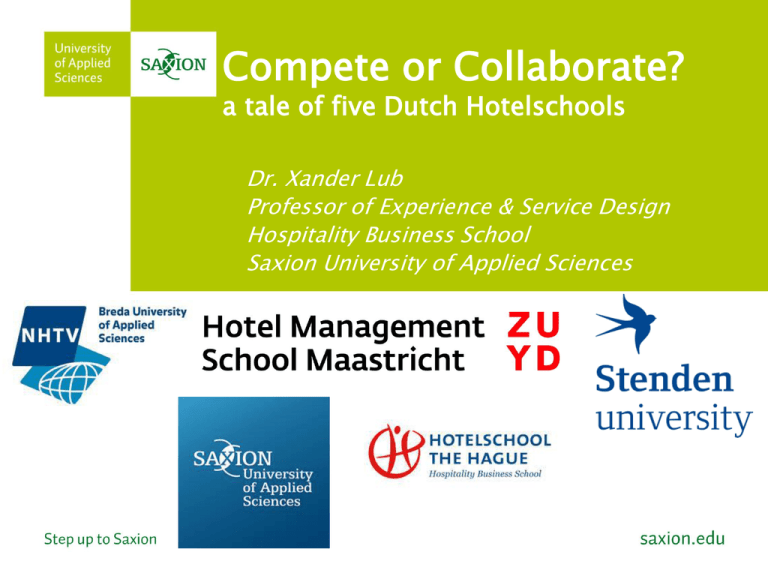
Compete or Collaborate? a tale of five Dutch Hotelschools Dr. Xander Lub Professor of Experience & Service Design Hospitality Business School Saxion University of Applied Sciences Introduction • Lector/Professor @ Saxion • Ass. Professor @ VU University • Coordinator of Hospitality Excellence Programme • RAAK Partner Agenda • • • • Change Compete or collaborate The case of five hotelschools (in a tiny country) Collaboration – examples Change -Major Drivers Global Shifts Digital Shifts Individualization Hotel Industry drivers Customer power Peer2Peer Change of ownership OTA Industry blurring Education Industry Drivers • Competition • Traditional universities –more applied courses & research • Hospitality management programmes absorbed into business schools • MOOC’s • Private education • • • • All competing within a Bologna framework International playing field Accreditation and audit vs agility Education institutes become knowledge institutes • Research • Knowledge partnerships with industry Change • In other words, lots of change! • Our curricula are outdated by the time students reach the market • How to prepare our students and our teachers: • Learn to learn, learn to innovate! Compete or collaborate? Compete or collaborate? In a knowledge economy, collaboration is the new competition Five hotelschools – a tiny country • Seven years back –bitter competition Then: • Change of directors • Grassroots collaborations btw staff exchanging relevant knowledge • Shared purpose –the “dutch hotello” Five schools –several forms of early collaboration • Dublin descriptors- jointly translated to competencies for hotel management students • Inch – a joint alumni network with many events for “dutch hotellos”- initiative of alumni • Information exchange networks btw librarians, internship coordinators, economics teachers… • Increasing presence of dutch hospitality researchers at international conferences • Cross-school supervision of PhDs Two collaboration case studies • RAAK research project • Hospitality Excellence Platform Some collaboration case studies – RAAK • RAAK research project (see previous presentation) • Project funded by government to stimulate regional innovation in SME • Eight partners: 2 research schools, 2 industry partners, 2 knowledge partners national & 2 knowledge partners international • Research grants (national/european) increasingly only awarded to collaborative initiatives, particularly with industry • Other research collaboration examples: CELTH, Hospitality Research Collaborative Some collaboration case studies – RAAK 2 • RAAK research project • Pros: • New knowledge and applications for industry • New insights and course materials for curriculum • Spin-off research projects • Authentic learning experiences for students (and teachers/researchers • Strengthened collaboration on other projects between stakeholders • Cons: • Project management and managing interests in a multi-stakeholder project can be very complicated • Could lead to delays Some collaboration case studies – Hospitality Excellence Platform • Hospitality Excellence Platform • Initiated and seed-funded by Dutch Royal Hospitality Board (now jointly paid by schools and industry) • Set up according to inter-organizational network principles • Aims to have top students together with best researchers and entrepreneurs to find solutions for societal problems that the industry faces • Teams are mixed across schools- so are professors • Extracurricular program –more agile in content and process Some collaboration case studies – Hospitality Excellence Platform 2 • Hospitality Excellence Platform • Pros and cons for industry and students to be discussed by Mark and Merel in more detail • Pros: • stronger research collaborations on topics; growing into a joint research agenda • incubator for new courses • platform for new collaborations • Platform for nurturing excellence • relationship building • Cons • Extra investment • Stress factor to daily operations Key Take-aways • Collaboration trumps competition in a knowledge economy • More fun • Breeds innovation • Combing strengths- all parties win • Requires mutual trust • Requires long-term effort (but what doesn’t?) • Needs time and a perspective on long-term collaboration Final words • Join us in collaboration! • Don’t get up, the best is yet to come: Mark & Merel!

